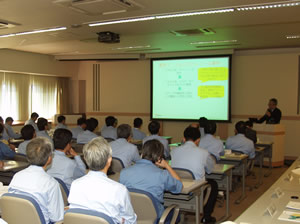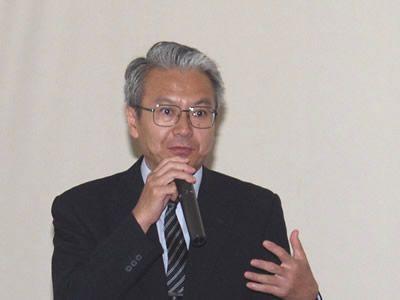|

Safety Presentation

Mr. Matumura
|
 About 50 persons, including the employees of Mitsubishi Electric Corporation. and cooperating companies, attended the Safety Presentation. About 50 persons, including the employees of Mitsubishi Electric Corporation. and cooperating companies, attended the Safety Presentation.
 At the beginning of the presentation, Mr. Sakuyama Group Vice Manager, General Manager Mitsubishi Electric Corporation, gave an address and said,"We produce high-and low-voltage switchgear systems as products related to the nuclear power plants. We have now launched a design of Tomari 3 owned by Hokkaido Electric Power, and reaffirm nuclear safety and reliability.We discuss about nuclear safety in today's lecture and information exchange session. We want to design and make more reliable products, utilizing lessons learned from these events for our future operations." At the beginning of the presentation, Mr. Sakuyama Group Vice Manager, General Manager Mitsubishi Electric Corporation, gave an address and said,"We produce high-and low-voltage switchgear systems as products related to the nuclear power plants. We have now launched a design of Tomari 3 owned by Hokkaido Electric Power, and reaffirm nuclear safety and reliability.We discuss about nuclear safety in today's lecture and information exchange session. We want to design and make more reliable products, utilizing lessons learned from these events for our future operations."
 After the address, Mr. Machida, General Manager of NSnet, introduced NSnet activities, and this was followed by a lecture entitled "For establishing compliance and open communication." delivered by Mr. Tatsuo Muramatsu, Manager, Nuclear Power Engineering, Quality & Safety Management Department, Tokyo Electric Power Company. After the address, Mr. Machida, General Manager of NSnet, introduced NSnet activities, and this was followed by a lecture entitled "For establishing compliance and open communication." delivered by Mr. Tatsuo Muramatsu, Manager, Nuclear Power Engineering, Quality & Safety Management Department, Tokyo Electric Power Company.
 During the lecture, he introduced domestic and overseas successful and unsuccessful compliance cases and TEPCO' s efforts for improving the corporate culture stemmed from the maintenance problem in nuclear power plants, and also presented human characteristics that impair communication through a video focusing on medical accidents that resulted from communication errors. During the lecture, he introduced domestic and overseas successful and unsuccessful compliance cases and TEPCO' s efforts for improving the corporate culture stemmed from the maintenance problem in nuclear power plants, and also presented human characteristics that impair communication through a video focusing on medical accidents that resulted from communication errors.
 "There are many successful and unsuccessful cases. Lessons learned from these cases allow immediate response even if any trouble occurs. "There are many successful and unsuccessful cases. Lessons learned from these cases allow immediate response even if any trouble occurs.
 Successful compliance cases include a case where J&J was notified that cyanide was mixed in the drug. J&J did not significantly impair its credibility because of assigning the highest priority to the safety of consumers and taking best measures. Unsuccessful compliance cases include Midori Juji's HIV-tainted-blood scandal and Snow Brand Milk Products' food poisoning scandal. USA's invasion to Cuba Pigs Bay. is called a case of groupthink Lessons from these cases include "an ethic in the small society such as a company that takes precedence over a social ethic," "corporate culture under which lessons from past similar scandals and incidents are not utilized," "an inward-looking corporate structure under which a company is a content with brand names" and "organizations that have stronger groupthink." In particular, groupthink is seen in an organization that has high solidarity, unity and loyalty. In order to avoid groupthink, corporate culture is required where critical opinions and comments are accepted. Successful compliance cases include a case where J&J was notified that cyanide was mixed in the drug. J&J did not significantly impair its credibility because of assigning the highest priority to the safety of consumers and taking best measures. Unsuccessful compliance cases include Midori Juji's HIV-tainted-blood scandal and Snow Brand Milk Products' food poisoning scandal. USA's invasion to Cuba Pigs Bay. is called a case of groupthink Lessons from these cases include "an ethic in the small society such as a company that takes precedence over a social ethic," "corporate culture under which lessons from past similar scandals and incidents are not utilized," "an inward-looking corporate structure under which a company is a content with brand names" and "organizations that have stronger groupthink." In particular, groupthink is seen in an organization that has high solidarity, unity and loyalty. In order to avoid groupthink, corporate culture is required where critical opinions and comments are accepted.
 The maintenance problems in TEPCO's nuclear power plants are also unsuccessful compliance cases. TEPCO announced " four commitments" in order to prevent the recurrence of these cases and to restore public confidence. They are "promoting disclosure of information and ensuring transparency of nuclear operations," "creating a work environment where proper operations can be carried out", "strengthening internal surveillance and reforming our corporate culture," and "promoting observance of corporate ethics." Internal and external open communication is considered to be important for the establishment of these commitments. The maintenance problems in TEPCO's nuclear power plants are also unsuccessful compliance cases. TEPCO announced " four commitments" in order to prevent the recurrence of these cases and to restore public confidence. They are "promoting disclosure of information and ensuring transparency of nuclear operations," "creating a work environment where proper operations can be carried out", "strengthening internal surveillance and reforming our corporate culture," and "promoting observance of corporate ethics." Internal and external open communication is considered to be important for the establishment of these commitments.
 Human characteristics that deteriorate open communication include "conformity", "social loafing", "authority gradient" and "story building strategy". Understanding these characteristics and taking measures against them will lead to the establishment of good communication.' Human characteristics that deteriorate open communication include "conformity", "social loafing", "authority gradient" and "story building strategy". Understanding these characteristics and taking measures against them will lead to the establishment of good communication.'
|
 At the safety information exchange session, we asked Mr. Tsutomu Mieda, Manager, Quality Assurance Department, Nuclear Power Division, Ishikawajima-Harima Heavy Industries Co., Ltd, give an in-depth explanation about the good practices cited by the peer review of the regarding "Many-sided and wide range design verification." At the safety information exchange session, we asked Mr. Tsutomu Mieda, Manager, Quality Assurance Department, Nuclear Power Division, Ishikawajima-Harima Heavy Industries Co., Ltd, give an in-depth explanation about the good practices cited by the peer review of the regarding "Many-sided and wide range design verification."
 The main information and opinions exchanged were: The main information and opinions exchanged were:
- |
I felt it quantitative and very useful to determine a method for verifying designs based on the product of degrees of inconformity impacts and technical instability (evaluation point), but think it difficult to decide a degree of technical instability. What members determine the degree? |
- |
I think it difficult to extract and evaluate all issues with this method. Additional review is required to reduce nonconforming items. For reference, a degree of technical instability is determined by a design department chief. For instance, we have a measure on which a degree of the instability is "1" or "2" for a design that was introduced in a precursor and on which it is "5" for a design that is first introduced in a nuclear unit. |
- |
We also have difficulties in developing and educating successors. Tell me good ideas and methods for it. |
- |
It is becoming difficult to hand down technologies because there are fewer new plants. We are also coping with the same problem. We have employees take charge of regular inspections with a view toward technology transmission. |
|







